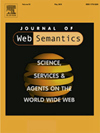
Journal of Web Semantics
網絡語義學雜志
- 期刊周期:Quarterly
- 研究方向:工程技術
- 影響因子:2.429
- 通訊地址:ELSEVIER SCIENCE BV, PO BOX 211, AMSTERDAM, NETHERLANDS, 1000 AE
- 官網:http://www.journals.elsevier.com/journal-of-web-semantics/
- 投稿地址:http://ees.elsevier.com/jws/default.asp?pg=preRegistration.asp
- 審稿速度:>12周,或約稿
中文簡介
《網絡語義學雜志》是一本跨學科的雜志,它是基于多學科領域的研究和應用,有助于知識密集型和智能化服務網絡的發展。這些領域包括:知識技術、本體論、代理、數據庫和語義網格,顯然,諸如信息檢索、語言技術、人機交互和知識發現等學科也具有重要的相關性。涵蓋了語義Web開發的所有方面。還鼓勵出版大規模實驗及其分析,以清楚地說明將語義引入現有Web界面、內容和服務的場景和方法。該期刊強調出版結合不同學科領域的理論、方法和實驗的論文,以提供創新的語義方法和應用。《網絡語義學雜志》主要介紹各種應用領域,包括:電子商務、電子社區、知識管理、電子學習、數字圖書館和電子科學。《Web語義學雜志》以一個多用途網站為特色,該網站位于:http://www.semanticwebjournal.org/。此外,我們還鼓勵讀者訪問《Web語義雜志》博客http://journal of web semantics.blogspot.com/,了解更多信息和相關鏈接。《Web語義雜志》包括但不限于以下主要技術領域:?語義網?知識技術?本體論?代理?數據庫?語義網格和對等技術?信息檢索?語言技術?人機交互?知識發現?網絡標準《Web語義雜志》涵蓋的主要應用領域包括:?電子商務?共同體?知識管理?電子學習?數字圖書館?科學知識每個區域都由一個區域編輯器覆蓋,該編輯器支持總編輯器。此外,區域編輯負責管理各區域提交論文的審查過程。《Web語義雜志》發表了四種類型的論文:?研究論文:研究論文是根據原創性、技術深度和正確性以及對目標讀者的興趣來判斷的。研究論文建議有15-25頁的雙欄格式。?調查報告:我們很少接受調查報告,除了對相關方法和系統的全面列舉,我們希望調查報告能夠獲得實質性的技術見解。調查報告建議有15-25頁的雙欄格式。?本體論論文:我們發布面向社區的本體論論文描述,如果他們從現實世界用戶和語義Web專家那里獲得興趣的話。本體論文建議有6-8頁的雙欄格式。感興趣的作者可以在這里找到對本體論論文的詳細要求。?系統論文:廣泛采用的語義系統和在語義Web社區中產生遠遠高于平均水平的興趣的系統,可以在系統論文中進行解釋。系統文件建議有6-8頁的雙欄格式。感興趣的作者可以在這里找到系統論文的詳細需求如果紙張的目標允許長度偏差,則允許使用較短或較長的紙張。不必要的短或長的描述將對接受的機會產生負面影響。
英文簡介
The Journal of Web Semantics is an interdisciplinary journal based on research and applications of various subject areas that contribute to the development of a knowledge-intensive and intelligent service Web. These areas include: knowledge technologies, ontology, agents, databases and the semantic grid, obviously disciplines like information retrieval, language technology, human-computer interaction and knowledge discovery are of major relevance as well. All aspects of the Semantic Web development are covered. The publication of large-scale experiments and their analysis is also encouraged to clearly illustrate scenarios and methods that introduce semantics into existing Web interfaces, contents and services. The journal emphasizes the publication of papers that combine theories, methods and experiments from different subject areas in order to deliver innovative semantic methods and applications.The Journal of Web Semantics addresses various prominent application areas including: e-business, e-community, knowledge management, e-learning, digital libraries and e-sciences.The Journal of Web Semantics features a multi-purpose web site, which can be found at: http://www.semanticwebjournal.org/. Readers are also encouraged to visit the Journal of Web Semantics blog, at http://journalofwebsemantics.blogspot.com/ for more information and related links.The Journal of Web Semantics includes, but is not limited to, the following major technology areas:? The Semantic Web ? Knowledge Technologies ? Ontology ? Agents ? Databases ? Semantic Grid and Peer-to-Peer Technology ? Information Retrieval ? Language Technology ? Human-Computer Interaction ? Knowledge Discovery ? Web StandardsMajor application areas that are covered by the Journal of Web Semantics are:? eBusiness ? eCommunity ? Knowledge Management ? eLearning ? Digital Libraries ? eScienceEach of these areas is covered by an area editor who supports the editors-in-chief. Furthermore, area editors manage the review process for submitted papers in the respective areas.The Journal of Web Semantics publishes four types of papers:? Research papers: Research papers are judged by originality, technical depth and correctness, as well as interest to our target readership. Research papers are recommended to have 15 - 25 pages in double column format.? Survey papers: We rarely accept survey papers, and beyond a sheer enumeration of relevant methods and systems, we expect a substantial technical insight to be gained by a survey paper. Survey papers are recommended to have 15 - 25 pages in double column format.? Ontology papers: We publish community-oriented description of ontology papers, if they generate interests from real-world users and semantic Web experts. Ontology papers are recommended to have 6 - 8 pages in double column format. Interested authors may here find a detailed Call-for-Ontology papers ? System papers: Widely adopted semantic systems and systems that generate a far above average amount of interest in the Semantic Web community, may be explained in systems papers. Systems papers are recommended to have 6 - 8 pages in double column format. Interested authors may here find a detailed Call-for-System papersShorter or longer papers are allowable, if the objectives of a paper warrant deviating length. Descriptions that are either unnecessarily short or long will negatively impact chances of acceptance.
近年期刊自引率趨勢圖
JCR分區
| JCR分區等級 | JCR所屬學科 | 分區 | 影響因子 |
| Q2 | COMPUTER SCIENCE, SOFTWARE ENGINEERING | Q2 | 2.77 |
| COMPUTER SCIENCE, ARTIFICIAL INTELLIGENCE | Q3 | ||
| COMPUTER SCIENCE, INFORMATION SYSTEMS | Q3 |
近年期刊影響因子趨勢圖
CiteScore數值
| CiteScore | SJR | SNIP | 學科類別 | 分區 | 排名 | 百分位 |
| 7.20 | 0.980 | 2.470 | 大類:Computer Science 小類:Computer Networks and Communications | Q1 | 59 / 359 |
83% |
| 大類:Computer Science 小類:Human-Computer Interaction | Q1 | 26 / 128 |
80% |
|||
| 大類:Computer Science 小類:Software | Q1 | 82 / 398 |
79% |
相關工程技術SCI期刊推薦
- SemimonthlyADVANCED MATERIALS
- Journal of Materials Chemistry A
- MonthlyADVANCED FUNCTIONAL MATERIALS
- SemimonthlyAPPLIED CATALYSIS B-ENVIRONMENTAL
- SemimonthlyJOURNAL OF HAZARDOUS MATERIALS
- SemimonthlyJOURNAL OF ALLOYS AND COMPOUNDS
- MonthlyBiotechnology for Biofuels
- Materials Science & Engineering C-Materials for Biological Applications
- MonthlySmall
- MonthlyJOURNAL OF THE ELECTROCHEMICAL SOCIETY
